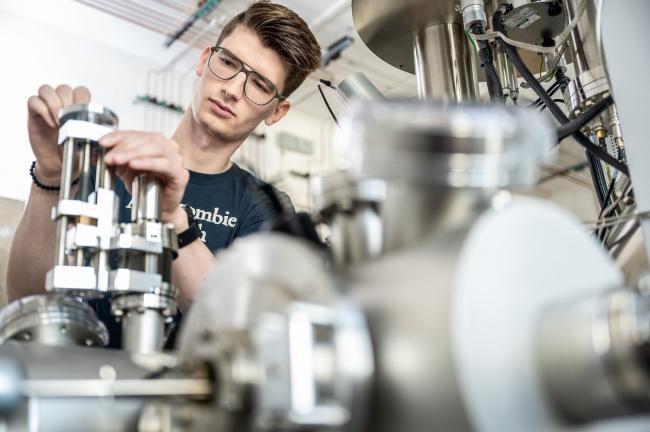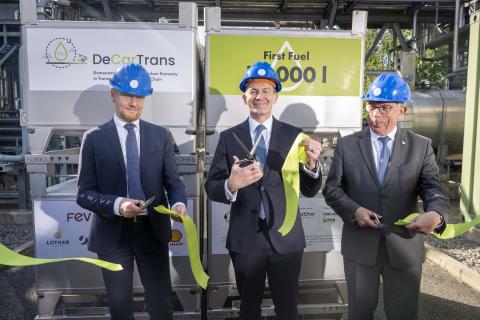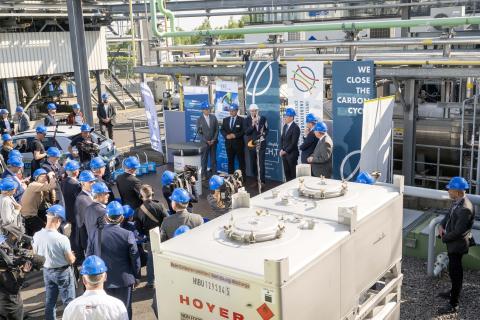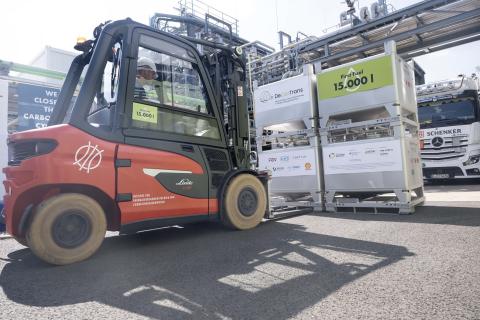A consortium from research and industry, including teams from the TU Bergakademie Freiberg and Chemieanlagenbau Chemnitz GmbH (CAC), plans to produce a total of 380,000 litres of green petrol (e-fuel) over the next four years. The synthetic fuel will be produced from biogenic or regeneratively produced methanol in a demonstration plant in Freiberg, Saxony. On 25 May, the first 15,000 litres of the synthetic petrol produced in the project were collected from the pilot plant.With the production of the e-fuel over the planned period of four years, the project aims to demonstrate that up to 90 percent CO2 savings are possible with the help of a carbon cycle. The joint project "Demonstrating a Circular Carbon Economy in Transport along the Value Chain" - DeCarTrans - is funded by the Federal Ministry of Digital Affairs and Transport (BMDV).
Cooperation with industry partners in Saxony
The sub-project of the TU Bergakademie Freiberg is being realised in close cooperation with the technology provider CAC and is receiving funding of 12.78 million euros. The first 15,000 litres of the synthetic petrol produced as part of the project were made available at the demonstration plant on 25 May. "After this initial trial run, the large-scale petrol synthesis plant operated at the TU Bergakademie Freiberg will be equipped with an optimised product preparation system that will enable further improvements in petrol quality," explains Prof. Martin Gräbner. "Afterwards, the continuous operation capability of the production process is to be confirmed in further test campaigns lasting several months," says the project manager and holder of the professorship for energy process technology.
On the application of the process, Jörg Engelmann, Managing Director of CAC, explains: "A prerequisite for implementation as large-scale industrial plants are political decisions to give investors the necessary securities. Only with openness to technology and quick decisions can the climate goals in the transport sector be achieved." As the technology provider for this petrol synthesis, CAC brings many years of expertise as an engineering company for the planning and implementation of complex chemical plants. Starting with methanol, which can be produced from carbon dioxide (CO2) and "green" hydrogen (H2), among others, CAC developed the patented process. "We are looking forward to confirming and further improving the marketability of our technology with this project, the intended endurance tests and conversion measures," says Engelmann.
Furthermore, the researchers want to test different qualities of regeneratively produced methanol at the TU Bergakademie Freiberg. The catalysts required are also being optimised at the Freiberg Chair of Reaction Engineering to make production even more efficient.
Running production continuously
By 2026, 380,000 litres of petrol are to be produced, which will then be made available to the project partners for fuel tests as well as extensive motor vehicle tests.
The large-scale test facility for synthetic petrol was built by CAC at the TU Bergakademie Freiberg in 2009 as the first and largest of its kind in Germany. Within the framework of several research projects, funded by the federal government, the Free State of Saxony and with CAC's own funds, it was possible to continue development until 2023, patent the technology and prepare it for large-scale production. The DeCarTrans joint project now underway, funded by the BMDV, makes it possible to operate petrol synthesis in continuous use and provide fuels in sufficient quantities for demonstration purposes.

Passende Studiengänge

Passende Studiengänge
Further information
About DeCarTrans
In addition to the TU Bergakademie Freiberg and Chemieanlagenbau Chemnitz GmbH, the funded partners of the project Demonstrating a Circular Carbon Economy in Transport Along the Value Chain (DeCarTrans) include FEV Europe GmbH, Hermann Lother & Co. Mineralölhandelsgesellschaft mbH, Coryton Advanced Fuels Deutschland GmbH and Forschungszentrum Jülich GmbH. Other companies from the automotive and mineral oil industries support the project as associated partners.
The DeCarTrans project is funded by the Federal Ministry of Digital Affairs and Transport with a total of 14.93 million euros as part of the overall Renewable Fuels Concept. The funding guideline for the development of renewable fuels is coordinated by NOW GmbH and implemented by the project management agencies VDI/VDE Innovation + Technik GmbH and Fachagentur Nachwachsende Rohstoffe e. V..
About E-Fuels
E-fuels are liquid fuels produced synthetically with renewable electricity, which can be used to power cars (1.2 billion worldwide), trucks, aircraft, ships or heating systems - anything with an internal combustion engine - in a climate-friendly way. If e-fuels are used in their pure form, CO2 emissions can be reduced by up to 90 percent compared to mineral fuels. In addition, e-fuels can be made available nationwide via the existing filling station network and can be stored and transported.
In methanol-based e-fuel processes, another advantage is that the production of methanol can take place at locations where regeneratively generated electricity is available in abundance and thus cheaply as an essential "raw material". This ensures that renewable energy can be imported to Germany and Europe in large quantities to cover the energy demand sustainably in the long term.
The drop-in-capable synthetic petrol produced from bio-methanol in the DeCarTrans project fulfils the requirements of the DIN EN 228 standard as an E10 blend, is registered according to REACH and can directly replace conventional fossil fuel or be added to it - without technical modifications to the vehicle. In an industrial plant, production costs of less than 1 euro per litre could already be achieved today.
The Federal Minister for Digital Affairs and Transport, Volker Wissing, and Saxony's Prime Minister, Michael Kretschmer, will inform themselves on 25 May in Freiberg about the first continuous production of synthetic fuel at the large-scale test facility of TU Bergakademie Freiberg and Chemieanlagenbau Chemnitz.
The first 15,000 litres of synthetic petrol produced in the DeCarTrans project will be collected from the large-scale test facility in Freiberg and made available to the project partners for fuel tests and motor vehicle tests. A total of around 380,000 litres of e-fuels are to be produced at the large-scale petrol synthesis plant.



